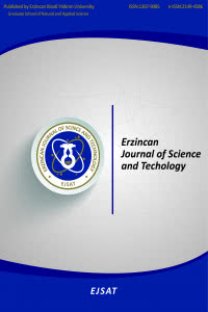Mathematical Success with Fuzzy Logic Modeling
Mathematical Success with Fuzzy Logic Modeling
Mathematics Achievement Fuzzy Logic, Education,
___
- [1] Ural, A., 2014, Investigation of Mathematical Modeling Skills of Pre-service Mathematics Teachers, Journal of Dicle University Ziya Gökalp Faculty of Education, 23,110-141.
- [2] Zadeh, L.A.,1965, FuzzySets. Information and Control, 8, 338-353.
- [3] Paksoy,T., Yapıcı Pehlivan, N., Özceylan, E., 2013. Fuzzy Set Theory. Nobel Publication, Ankara, 214s.
- [4] Özdemir, A., Alaybeyoğlu, A., Balbal, K.F., 2019. Applications of Fuzzy Logic in Education. Journal of Science, Education, Art and Technology, 3(1), 45-50.
- [5] Akbay, R., Sahiner, A., Yılmaz, N. (2016). Determining of the achievement of students by using classical and modern optimization techniques. Eurasian Journal of Physics & Chemistry Education, 8, 3–13.
- [6] Şener, K., (2001). İlköğretim öğrencilerinin çalışma alışkanlıklarının matematikteki başarılarına etkisi, Fırat Üniversitesi Sosyal Bilimler Enstitüsü, Yayınlanmamış Yüksek Lisans Tezi.
- [7] Yılmaz, M., Arslan, E., 2005. Using Fuzzy Logic in Solving Geodetic Problems. Chamber of Surveying and Cadastre Engineers Engineering Surveys STB Commission 2nd Engineering Surveys Symposium, 23-25 November, Istanbul, 512-522.
- [8] Sen, Z., 2009. Fuzzy Logic Principles and Modeling. Water Foundation Publications, Istanbul, 361s.
- [9] Takagi, T., Sugeno, M., (1985). Fuzzy identification of systems and its applications to modeling and control, IEEE Trans. Syst., Man and Cybernetics 15, 116-132
- [10] Mamdani E. H.,(1974).Application of fuzzy algorithms for control of simple dynamic plant, Proc. IEEE 121(12), 1585-1588.
- [11] Mamdani E. H., Assilian S., (1975), An experiment in linguistic synthesis with a fuzzy logic controller, International Journal of Man-Machine Studies 7(1) ,1-13.
- ISSN: 1307-9085
- Yayın Aralığı: 3
- Başlangıç: 2008
- Yayıncı: Erzincan Binali Yıldırım Üniversitesi, Fen Bilimleri Enstitüsü
Determination of Genetic Diversity in Some Pumpkin Genotypes Using SSR Marker Technique
Some Properties of r-Small Submodules
Celil NEBİYEV, Hasan Hüseyin ÖKTEN
Zinc(II) and Cadmium(II) Salphen Catalyzed Alkylation Reactions to Form α-Alkylated Ketones
Investigation of the effects of distress on health practices in pregnant women
Bahadır ÖZKILBAÇ, Tevhit KARACALI
